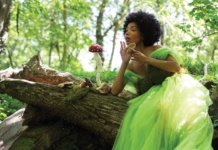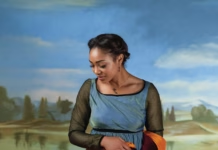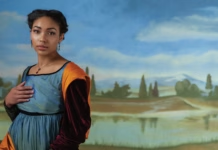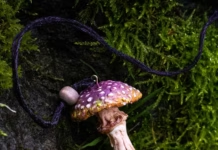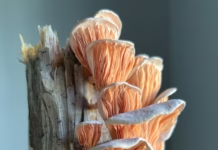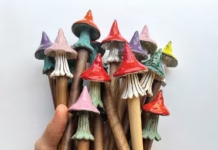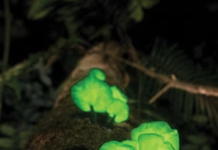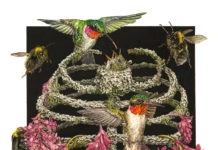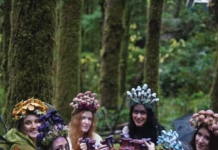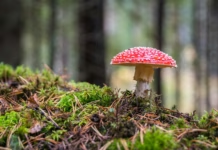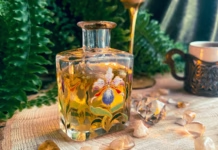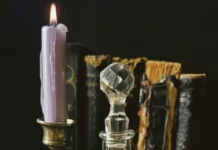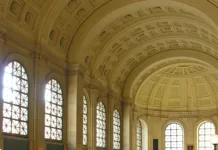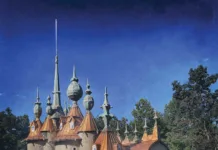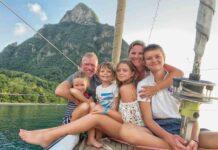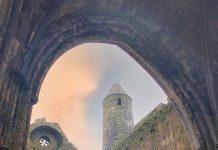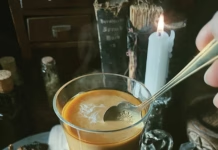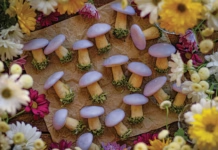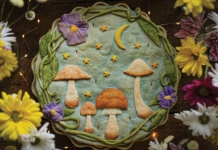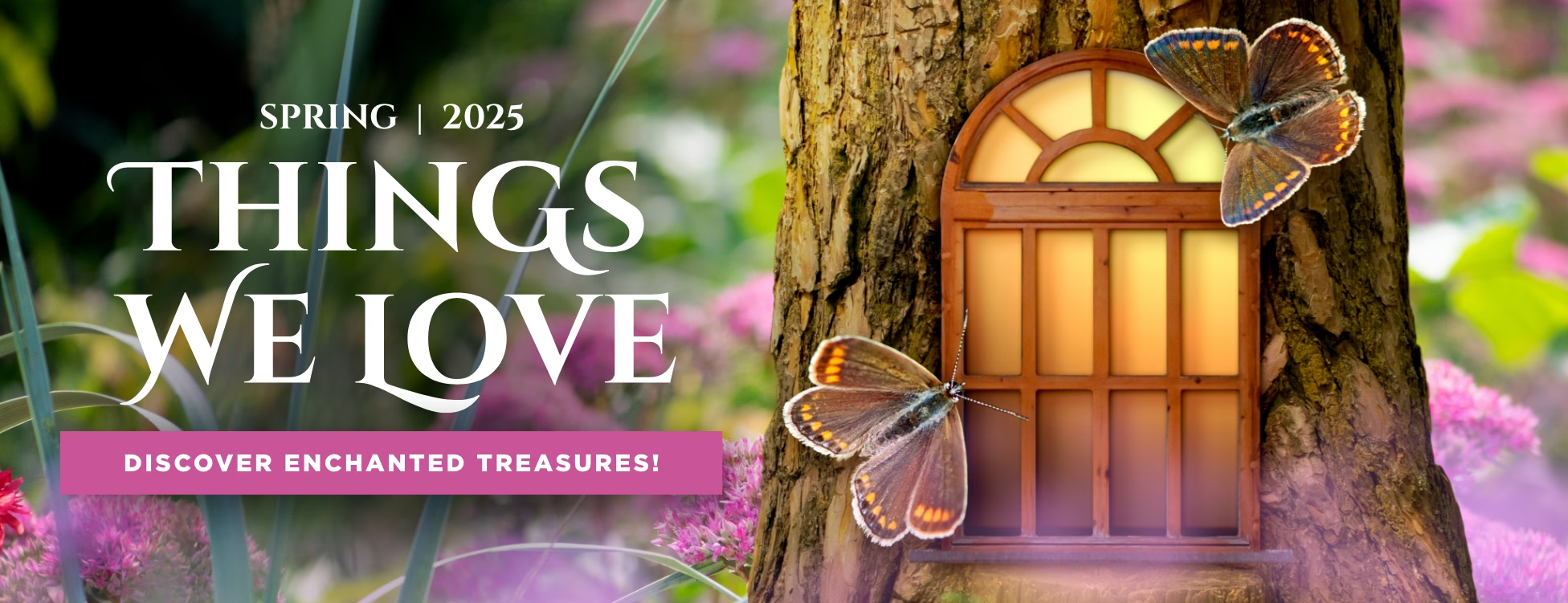Pull anchor up from a tiny stone bay with a cave. Sail softly over the sea so calm and eerie, silver and slithering still. Drop anchor cozy and snug at an empty island you’ve been reading about, surrounded with cliffs and birds. Walk the huge rocks off the shore that contain so many stories of survival, exploration, and history. Feel magic in the moment. Pull anchor again and head north with hot tea in hand, finding room on the sea.
To sail is to feel these directions in as many moments and in as many days as possible. We go from place to place begging our souls to digest enough, asking our minds to absorb enough, wanting time to explore enough. We will always ask, “Is it time to move on? Have I held this image in my mind so that when I sail away, I can still smell it and taste it?” But we move, and most of the magic is in the moving.
I was raised in the dunes that follow the shore of Lake Michigan. I would set up camp in the woods and look off into the distance as far as I could see. I knew there was land across the endlessness that was unreachable with my land legs. This began my love of sailboats and the magic a hull and sail offered, promising to sweep me to otherwise unattainable locations.
After my undergraduate degree in poetry, a thirst for travel possessed me, and I bought a van, tore out the seats for a bed, and traveled the States for the next two years. Shortly thereafter, I earned my teaching degree and married a sailor. Living a life with a house and schedule ended when I was homeschooling four children and my husband, Nick, became mobile in his work.
On Father’s Day of 2017, our family of six moved to a boat in the Caribbean that only my husband had seen. My youngest was in diapers and still breastfeeding. Selkie, our forty-nine-foot Westerly, tied at a marina, awaited the adventure that has continued. For five years, we have sailed up and down the Caribbean Islands, across the North Atlantic via Bermuda and the Azores, explored Ireland, wintered in Scotland, ping-ponged between the Outer Hebrides and Skye up to Shetland and over to Norway, traversed the Skagerrak and Kattegat to Denmark, circled the Baltic Sea and visited Russia, crossed the English Channel to Southern England where we quarantined during Covid, crossed the Bay of Biscay, visited multiple locations in Galicia, Spain, sailed to the Canary Islands, Cape Verde, back to the Caribbean, stopped in the Dominican Republic, stayed in Guatemala for hurricane season, enjoyed Panama and the canal to reach the Pacific, swam with sharks and sea lions in the Galapagos, and are currently headed for French Polynesia. In summary, we have circumnavigated the Atlantic and now have the Pacific in helm.

We choose this life of high highs and low lows. There are very few in-betweens, and if there are, the call to head out creeps back into the soul within a week. I can be covered in puke, holding a bucket for one of my children or myself, pushed all around by waves and wind, trying to cook on a gimbaled stove, and curse the life. But once we hit land and discover a new place and culture, within a week, we are all saying, “What’s next?” The life can also be filled with calm seas and a perfect wind, whales following with their songs echoing through the hull, my soul filled to the brim with gratefulness and awe. Like I said, high highs and low lows.
We sail because we can. Nick survived the storm that hit the Chicago to Mac race on Lake Michigan in 2011. The sky turned green with lightning, the rail was in the water with no sail, and the wind blew to 110 knots. I said, “If you can do that and get home safely, I trust you.” Sure, it can be terrifying, and I can hold my youngest child in my arms, feel Selkie sliding down gigantic waves, see my husband white-knuckle the helm, and curse my choices. But I can also be sailing downwind on a sunny day surrounded by hundreds of dolphins as far as the eye can see. I can slowly slide over a dark, night sea that has rivers of glowing jellyfish. I can dip my hands into the ocean after the sun sets with my oldest son and play with the phosphorescence as if we had magic wands. I can be fully dressed in my bibs, jacket, and hat and be pounding into the waves taking on water, watching schoolbooks float on the floor, and praying for the sun to rise, but I can also be moored outside the Pitons on Christmas and venture inland for a mud bath and a rinse in the natural pools. I can be tied to dock, banging and banging in strong winds, knowing that something might break and that it’s unsafe to leave the boat, or I can be tied to a dock under a castle in Scotland talking to locals about life on the sea. I can be motoring through a billion jellyfish or be in the middle of fjord watching cliff jumpers parachute down around me. Why do I sail? I’m addicted to these high highs and low lows. The more I see of the world, the more I realize there is so much more to see.
A sturdy anchor hold, a cityscape, a distant island, cobalt water moving in a steady breeze that fills my sails, a child in my arms who smells like salt, a single pelican, a tangerine sunset—this enchants me. Forty-nine feet of hull filled to the brim with my husband and four children is magical. When I share this and write, I am usually under the vastness of an immense number of stars, Milky Way brilliant, moon a sliver, phosphorescence in the water, waves sliding under in darkness, sails staying full, waves lapping with kindness, hot tea cupped in hand, words chosen carefully for a poem—these are my perfect night moves on the ocean. When things are all just right, there is quiet creativity, a simile, a juxtaposition.
Sometimes things aren’t perfect. Most frequently we are asked, “What is the worst weather you have ever seen?” There are five answers in five years: storm mid-north Atlantic with no help in sight, against wind and tide coming out of the Kiel Canal, psychologically finished off the shores of Portugal, petrified that the nine fishing boats surrounding us around Honduras were pirates, and the Skagerrak above Denmark.
Of course, it is interesting to tell these stories, but what I find more enchanting is a regular day. When the air is right, the coffee is made, and no one is seasick, schoolbooks come out. On a weekday at sea, wi-fi does not exist. We have loads of books piled high under the foot of our bed in the aft, lined up on floors in bags, and completely covering the foot space on my side of the bed for the entire school year. These books were accumulated in the States, packed in bags, hauled through airports, brought from rental to rental in the Yucatan on scuba adventures, and then finally delivered to the boat. My older two kids, a freshman in high school and a middle schooler, do school in their own time in their own way, asking for help only when they need it. I spend the rest of the day schooling my kindergartener and third grader until the day is almost done. It’s usually tied in with cooking and cleaning, sailing and singing, but mostly involves what other kids their age are doing at desks that don’t move with the sway of the waves.
I also try to weasel in my graduate work with any free time I have, either getting a daily dose of reading done or whittling away at a paper. Only if I’m extremely lucky on the weekends do I find time to do what I love, which is to write.
On a regular day in January, breakfast was pancakes with canned peaches, then a bit of school, and a shore adventure to explore yet another island that we have encountered. On this day, we prepared for a hike and fun at the beach after school. We loaded into our dinghies with our buddy boat (Lucky Girl from Scotland, which carries a lovely couple with two spritely little boys), and motored to shore to beach our dinghies and head inland. Since Covid, most towns are eerily empty, but a few locals with shops and trinkets line the streets, and there are some confused tourists, sunburned, wandering, looking about. We head up an alley and get asked in Spanish to keep our masks on as we walk. A man in a hut asks us if we want a trail. This may be the only word he knows in English. He points to some dirt behind his house.
We duck under some hanging laundry and off we go, up a steep hill. Not far in, hoping for sloths, I spot a giant tarantula crossing the path behind the quick feet of our children. Further up the hill, with many tired complaints from the six children, we pass a dried-up riverbed and brilliantly colored tiny frogs darting up and down the rocks. At the top of the trail is a small Catholic shrine that looks well attended. With good conversation, we head further up a road to look out across the small island at the daunting Pacific that we have yet to cross. The walk back is long but executed with more enthusiasm, knowing that beach fun is still ahead.

After a day like this, school can sometimes be abandoned, but the conversations that take place on land about the environment and creatures that dwell there has filled in any gaps. I prepare a pork roast for dinner in our small, half-size oven while the kids swim away the last of their energy. A soundtrack to an epic film is played in the background while we bob on the water in mostly silence after a tiring day. My youngest sits on my lap for another brilliant, orange-peel sunset, and I am so grateful to see, truly see, the world, which contains so much water. Friends dinghy over for a goodnight hug. Only a wee bit of a film takes the last moments of our day. Perhaps this is not the most regular day, but it contains regular things. The magic is the motivation to do more than the regular.
A magical story that contains one of the five worst is from our most recent summer spent in Guatemala. Rio Dulce is used as a summer hurricane home for sailors. It invites cruisers to travel a day up the river lined with three-hundred-foot high jungle cliffs enough to inspire Tarzan. There’s a small catch though. To get in, if you are a sailboat with a deep draft, you must be tipped. A tipping is when you pay a local fishing boat captain to come grab your halyard, motor to the side, put your rail in the water (i.e. almost completely sideways) as you motor on over the shallow waters that protect the river’s entrance. The first step is to make sure all things are secure below; the boat will heel to one side much more than when sailing. Step two, brace yourself and get out your camera. It doesn’t take long and then you are in, completely ready to go through customs and find a sweet spot to get work done on the boat. Work here is cheap and good. We practically had our whole boat refitted and took a scuba trip to the Yucatan and Belize while it occurred.
Rio Dulce is intoxicating, but that is another story. This story involves entering and exiting. Once tipped in, you need a tip out. Equally exciting. But the trick is—something they don’t tell you coming in—is that all the Atlantic Ocean wants to funnel into this corner of Guatemala. There must be zero wind to motor out. The scary part is that you must sail very wide around Honduras to avoid the modern-day pirates that exist there. We chose to take a day motoring up the coast of Belize to get a good angle against the wind around Honduras. Sailors recommend 200 miles. The wind chose to keep us at 100 miles off the coast, and when we approached the shelf that extends 100 miles off the corner of the mainland, we were surrounded by nine fishing vessels that we were certain contained conspiring pirates. They spent the day testing us. They would motor right toward us in preparation to ram our hull unless we changed course. At sunset, they all stayed within eyesight, surrounding our boat.
With weather, you can change course, fall off, avoid. With humans, you pray, even if you are not religious. This night, I was trying to make spaghetti. I was so worried as I stashed food, hid my grandmother’s jewelry, and prepped what makeshift weapons we had that I burned the meatballs. Come darkness, when they started motoring right toward us again, I shed tears into my burnt meatball dinner. The night got darker, the distance got further. With our AIS locator device turned off, we changed course multiple times hoping to lose them. Nothing happened. No one tried to board us, steal from us, or threaten us—apart from the possible ramming. My stomach lurched. Spaghetti threatened to reappear, but we passed the troubled seas only psychologically damaged. Later that night, I looked at the stars that spread endless amounts of love and wonder in my heart. Low lows and high highs. A sea life can creep slowly like a gentle sloth holding her baby in the treetops or smash forward like inner-city taxi driver coming off a meth addiction.
Magic mostly occurs when we are at sea, and I am awakened for my night shift around 2:00 or 3:00 in the morning. The water world looms, and the stars spill in the skies with as much mystery as the water below. No boat in sight, just pure water, wind, and our floating home in movement with the earth’s elements. I’m alone. My family sleeps, and I have my tiny phone to write a poem. The top hatch of the hard Bimini is pushed wide open, and strapped into the cockpit with my life jacket, I poke my head out by the sails to locate all the constellations and planets I know.
Mystical enchantment is an understatement. It is vast bewilderment, awe of circumstance, humbleness in survival. The night sky splits open for me like a river, and the breeze opens and satisfies my soul. I am completely within myself—alive. Anything could happen, yet there is a notion that this current situation will hold, and I may just be held in it. There is so much unseen space that could possibly swallow me, but for some reason comforts me, and I am not lonely. Rain could sprinkle, stars could dwindle, but the phosphorescent sea that leaves behind fairy dust will twinkle brighter. The sea salt in the air splashing from the break of waves on the hull softens my skin and my composure to love the life. The mud is washed away. No shoes needed. I’ve been to places and nestled my children near crocodiles, volcano eruptions, and turtles. I’ve kissed them to bed near giant reefs, coconuts, and to the rhythm of local music. We’ve lived through being stuck going back and forth, and now we leave whispers on the wind as we set out into what may seem like an endless horizon.
Follow Magdalena Louise Hirt at sealongingselkie.net





